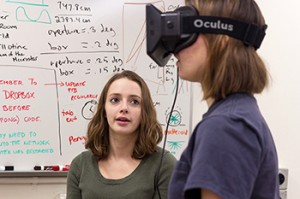
Madison Film Forum contributor Taylor Hanley was recently profiled on the UW-Madison College of Letters and Science News site for her research on perception and Immersive 3-D technology like the Oculus Rift headset.
Many of us know people who had difficulty watching Gravity and other recent features in IMAX 3-D. Difficulties also exist for the more immersive headset 3-D technoglogies, and Taylor wanted to figure out why that is the case.
As exciting as it is, immersive 3-D is just too much for most people. Hardly anyone can handle what are called “full-field simulations” without feeling woozy. That’s a problem for developers, not only at Oculus VR (makers of Oculus Rift), but in fields like medicine and military readiness, where 3-D simulation could potentially serve as a powerful learning tool.
Determining who feels sickest, and why, is the focus of University of Wisconsin-Madison senior Taylor Hanley’s year-long research project, funded by her 2013 Hilldale Award for Undergraduate Research. Hanley, who plans to graduate in May with a double major in communication arts and psychology, wanted a senior project that would allow her to explore an intersection between her two fields.
“I am extremely interested in how films affect people,” she says. “And 3-D is definitely a part of that now; we’re going in that direction. So how will people’s perceptions and experiences be influenced by 3-D technology?”
For more on Taylor’s research, read the rest of Mary Ellen Gabriel’s article at the College of Letters and Science News page.
[Edit: Apologies for the embarrassing misspelling of immersive, in the headline no less.]